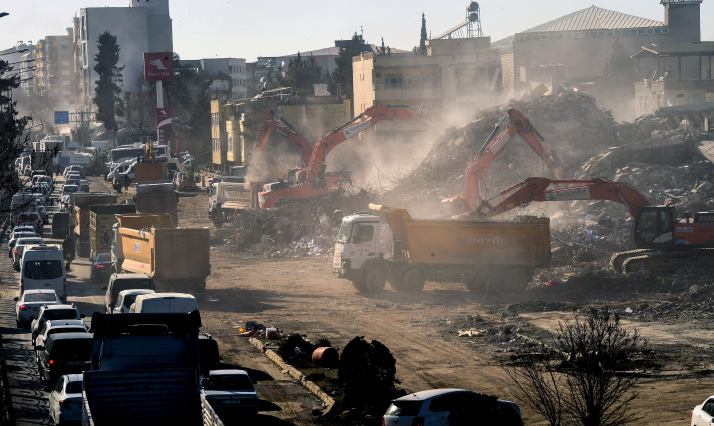| Voice |
| A shocking aftermath? | |
|
|
 Bulldozers clear earthquake debris in Adiyaman, Türkiye, on February 18 (XINHUA)
The earthquakes and their aftershocks that rocked Türkiye and neighboring Syria in early February had already claimed over 50,000 lives as of February 24. The World Health Organization has since projected the total number of people affected would amount to over 26 million. The tragedy has dealt a heavy blow to both countries' economies. Türkiye, an economic powerhouse in the Middle East, will struggle to recover from the aftermath. Syria, a country devastated after more than a decade of civil war and still under U.S. sanctions, is facing even more severe challenges in reconstruction. The natural disaster won't have a perceptible impact on global economic output, as the two countries combined account for only a small share of the world economy. For example, Türkiye's GDP exceeded $850 billion in 2022, 1 percent of the world's total last year. However, the global market will consider the risks mass earthquakes pose to the country's economy. For instance, the international significance of major infrastructure projects that have either already been built or are underway in Türkiye might decline due to potential disaster threats, while investment and construction costs will only rise. The quality of infrastructure within Türkiye, including that serving oil and gas transportation, is another concern, given the most recent reports, as of publication, stated more than 160,000 buildings containing 520,000 apartments had collapsed or been severely damaged in the recent quakes. Oil and gas supplies For the world economy as a whole, the logistics sector will suffer the biggest impact, with international oil, gas and other energy transportation particularly vulnerable. Türkiye bridges Southeastern Europe and Asia and is surrounded by four seas—the Mediterranean to the south, the Aegean to the west, the Sea of Marmara and the Black Sea to the north. It also borders major energy suppliers such as the Middle East and countries neighboring the Caspian Sea. This location makes the country an international logistics and transportation hub, with several oil and gas pipelines to Europe passing through it. However, Türkiye is also home to one of the world's most earthquake-prone zones. The port of Ceyhan in the Turkish Mediterranean, the country's most important oil and gas transit hub as well as the hopeful gateway for Central Asian crude oil exports, is not far from the epicenter of the quakes and had to be closed for several days due to aftershocks. The port sits at the intersection of the Baku-Tbilisi-Ceyhan and Kirkuk-Ceyhan pipelines. The first pipeline stretches 1,768 km, connecting Baku, capital of Azerbaijan, and Ceyhan via Tbilisi, capital of Georgia. In 2022, its capacity alone reached 224.39 million barrels of crude oil. The 970-km Kirkuk-Ceyhan pipeline carries the crude oil from the oil hub of Kirkuk in Iraq to Ceyhan for further export to international markets, and can pump up to 450,000 to 500,000 barrels per day. Russian President Vladimir Putin has already considered developing a "gas hub" in the country, given Russian supplies to Europe have been disrupted by Ukraine-related sanctions. Plus, Central Asian countries and Azerbaijan are also planning to open new oil and gas export routes, especially ones that lead into Europe. But now, the earthquakes may very well prove fatal for Türkiye's intentions to further raise its global resource and infrastructure status. On their part, the EU and the U.S. plan to open a Central Asia-Caspian Sea oil and gas pipeline to weaken Russia's control over energy supplies in the region, and Iran is keen to open oil and gas supply channels to Europe—all these will require building oil and gas pipelines that run through Türkiye.  Vehicles line up at a gas station in Budapest, capital of Hungary, amid a nationwide fuel shortage on December 6, 2022 (XINHUA)
Chronic condition The impact of the earthquakes on Europe's energy security and Russian crude oil exports will be decided by the extent of the damage to infrastructure, such as pipelines, and the speed and efficiency of recovery efforts. If the shocks severely damaged Türkiye's infrastructure, European energy importers might have to rely more on suppliers in North and West Africa rather than on their favorite Central Asia-Caspian Sea countries. This, in the long term, will further complicate their energy supply. After all, Russia is a natural fit. Back in October 1973, members of the Organization of Arab Petroleum Exporting Countries led by Saudi Arabia proclaimed an oil embargo which targeted nations that had supported Israel during a conflict between Israel and a coalition of Arab states led by Egypt and Syria. As a result, the price of a barrel of oil had quadrupled by 1974. At that time, 93 percent of Western Europe's energy consumption depended on supplies from Middle East petroleum exporters, putting a lot of pressure on regional countries. It was only after the oil shocks of the 1970s that they started to import, once again, oil and gas from their chief Cold War adversary—the Soviet Union, which helped enhance their energy security. Will today's European leaders perhaps learn from history? At the same time, the possible changes in international oil and gas transportation might in turn push Russia and Central Asia-Caspian Sea countries to export their oil and gas resources eastward through China, as to reach East Asia and the neighboring markets in Southeast Asia and beyond. This may also enable Japan and the Republic of Korea (ROK) to breathe a sigh of relief. Under the impact of the COVID-19 pandemic and the Russia-Ukraine conflict, these two exporters have both tumbled into trade deficits and their domestic inflation pressures remain high, mainly due to soaring energy prices on the international market. Japan, for example, imports about 90 percent of its energy and costs were already soaring from a jump in global oil, gas and coal prices, even before the yen fell to its lowest level in two decades last year. And, in September 2022, the ROK was seeking ways to reduce expensive energy imports after surging fuel costs and a weakening won had already pushed the country's trade deficit to a record. Needless to say, both countries must alleviate, and eliminate, the impact of high global energy prices as soon as possible before the aftermath becomes too shocking to handle. The author is a researcher with the Chinese Academy of International Trade and Economic Cooperation under the Ministry of Commerce Copyedited by Elsbeth van Paridon Comments to mamm@cicgamericas.com |
|
||||||||||||||||||||||||||||||
|